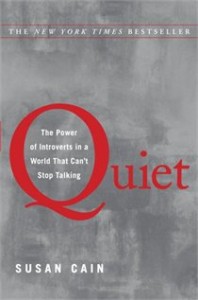Insightful Book Examines the Power of Introverts: Quiet by Susan Cain
Carl Jung made the terms extrovert and introvert popular descriptors of personality traits. Plainly speaking, extroverts are people who tend to enjoy interacting with others, are talkative, and assertive. Introverts are people who talk less, tend to enjoy self-reflection more, and prefer solitude or small groups of people.
In Susan Cain’s bestselling book Quiet: The Power of Introverts in a World That Can’t Stop Talking (Crown Publishing Group) she examines the historical, societal, and cultural embrace of extroversion as the ideal personality trait.
Quiet provides a thought-provoking look at what society overlooks by undervaluing introversion qualities, and offers advice for those seeking so-called “success” in an extrovert-dominated world.
About Susan Cain
 After studying law at Princeton and Harvard, Susan Cain worked as a corporate lawyer and negotiations consultant for several big-named corporations, such as Merrill Lynch and JP Morgan.
After studying law at Princeton and Harvard, Susan Cain worked as a corporate lawyer and negotiations consultant for several big-named corporations, such as Merrill Lynch and JP Morgan.
Cain, now an author, describes herself as an introvert, regardless of how this seems misaligned with her former profession. Preferring to be low-key and feeling anxiety before delivering speeches, Cain attributes her personal and professional success to her introvert tendencies. For example, being an introverted lawyer allowed her to easily build alliances and earn loyalty, concentrate effortlessly on her tasks, and granted her invaluable listening skills.
This seemingly conundrum is what she discusses in her book, Quiet: The Power of Introverts in a World That Can’t Stop Talking, a book that has received high praise from critics around the globe and became a New York Times bestseller.
Intriguing Discussion on Extroverts vs. Introverts
With extensive psychological and brain chemistry research behind this book, Cain’s Quiet draws attention to the contributions missed out on by society when the emphasis is placed on the “extrovert ideal.” For example, almost every type of learning or social interaction from an early age is designed towards extroverts. Introverts are often perceived as socially or culturally challenged because of their preference for quiet or even for solitude.
With real-life stories of “successful” introverts in an extrovert world, Quiet emphasizes how the different personality traits offer invaluable contributions to society. Readers will be engrossed with Cain’s discussion. She follows the rise of extroversion as our cultural ideal, and questions whether charisma is the best form of leadership. Quiet also covers an examination of creativity and innovation and whether or not collaboration kills it.
Cain also questions whether or not one’s personality is determined by nature or environment, and includes discussions on how free will, conscience, and even dopamine levels affect one’s personality.
Quiet an Insightful Book
 After a section on extroversion in other cultures, Cain concludes Quiet by debating whether or not to become a “pretend extrovert” at times, and offers advice on how to nurture an introverted child. For example, parents of introverted children should understand it’s okay for their child to need more space and master skills and passions at their own pace. She also notes that it’s important to not label kids as “shy” because being an introvert is not a fixed trait.
After a section on extroversion in other cultures, Cain concludes Quiet by debating whether or not to become a “pretend extrovert” at times, and offers advice on how to nurture an introverted child. For example, parents of introverted children should understand it’s okay for their child to need more space and master skills and passions at their own pace. She also notes that it’s important to not label kids as “shy” because being an introvert is not a fixed trait.
Quiet is a well written book that will help make many people feel more secure on their own personality continuum. It’s also a book that many teachers, employers, or friends of introverts will find useful in cultivating a stronger and more fruitful relationships.
To learn more about this bestselling book, please click > Quiet: The Power of Introverts in a World That Can’t Stop Talking by Susan Cainoo








